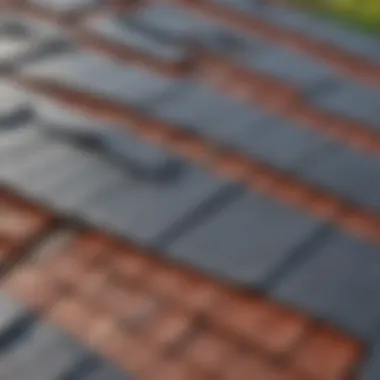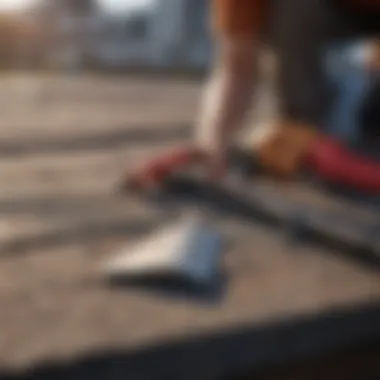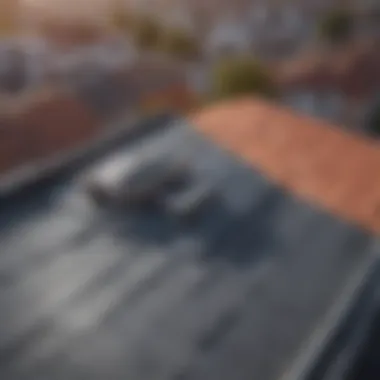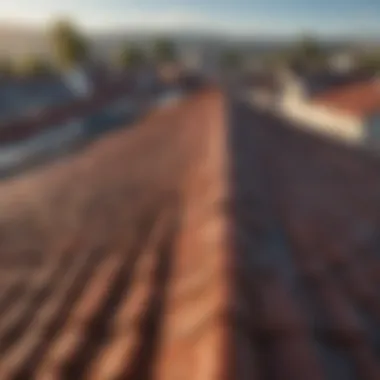Unveiling the Intricacies of Roof Longevity: Factors and Maintenance Insights


Market Analysis
Economic Insights
Economic indicators serve as a critical lens through which to examine the average lifespan of roofs. An overview of economic indicators provides a holistic view of the macroeconomic landscape, showcasing how factors such as interest rates and inflation rates can influence roofing decisions. Global economic trends play a pivotal role in shaping the demand for durable roofing materials and sustainable construction practices. The impact of economic events on markets highlights the interconnected nature of economic forces and roof longevity, illustrating the need for strategic foresight and adaptability.
Investment Strategies
Exploring investment strategies within the context of roofing longevity offers unique perspectives on preserving and enhancing the lifespan of roofs. Diversification techniques enable stakeholders to mitigate risks and maximize returns in roof maintenance investments. Embracing value investing principles allows for a nuanced approach to selecting high-quality roofing materials and services that offer long-term benefits. Risk management strategies provide a comprehensive framework for safeguarding roof assets against potential threats, ensuring resilience and sustainability in the face of unforeseen challenges.
Personal Finance Management
Personal finance management plays a crucial role in extending the lifespan of roofs through prudent budgeting and planning. Budgeting tips empower individuals to allocate resources efficiently towards roof maintenance and repair, fostering a culture of proactive care. Savings and retirement planning strategies contribute to a secure financial foundation that supports long-term roofing investments and replacements. Debt management advice offers insights into managing financial obligations responsibly, enabling individuals to prioritize roof longevity amidst competing financial demands.
Expert Financial Advice
Receiving expert financial advice in the realm of roofs equips stakeholders with the knowledge needed to make informed decisions and optimize their roofing investments. Investing for beginners introduces novice investors to the fundamentals of financial planning and risk assessment in the context of roofs. Advanced trading techniques provide seasoned investors with sophisticated strategies for maximizing returns and mitigating risks in roof-related portfolios. Wealth preservation strategies offer a comprehensive roadmap for safeguarding roof assets and ensuring their continued value and functionality over time.
Introduction
The significance of comprehending the average lifespan of a roof extends beyond mere practicality; it delves into the realm of financial prudence and property maintenance. By gaining a nuanced understanding of the factors at play, individuals can make informed decisions regarding roof installations, repairs, and replacements. This knowledge empowers homeowners to proactively manage their property, potentially saving them from costly repairs and ensuring the safety and durability of their homes.
In this article, we will explore the key determinants that impact roof longevity, from the materials used in construction to the influence of weather conditions and the role of maintenance practices. By dissecting these elements, readers will be equipped with the knowledge needed to extend the lifespan of their roofs effectively. Furthermore, we will discuss signs indicating when a roof may need replacement and offer practical tips on how to prolong the lifespan of various roofing materials. Stay tuned as we unravel the complexities surrounding the average lifespan of roofs, providing you with a comprehensive guide to ensuring the longevity and functionality of your property's most vital protective covering.
Factors Affecting Roof Longevity
Roofs are subjected to various elements that can affect their durability and lifespan. Understanding the factors that impact roof longevity is crucial in ensuring the longevity of your roof. The material composition, climate and weather conditions, installation quality, and maintenance practices play vital roles in determining how long a roof will last. By addressing these factors proactively, homeowners can significantly extend the lifespan of their roofs.


Material Composition
Asphalt Shingles
Asphalt shingles are a common roofing material known for their affordability and ease of installation. These shingles are versatile, available in different colors and styles to suit various aesthetic preferences. One key advantage of asphalt shingles is their durability in moderate weather conditions.
Metal Roofing
Metal roofing is gaining popularity due to its longevity and eco-friendly properties. Metal roofs are highly durable, resistant to fire, and can withstand extreme weather conditions. Additionally, metal roofing is recyclable, making it a sustainable choice for environmentally conscious homeowners.
Tile Roofs
Tile roofs are known for their timeless beauty and exceptional durability. Made from materials such as clay or concrete, tile roofs can last for decades with proper maintenance. They offer excellent protection against fire and weather elements, making them a durable choice for roofing.
Wood Shakes
Wood shakes provide a natural and rustic appearance to a home's exterior. While aesthetically pleasing, wood shakes require regular maintenance to prevent issues such as rot and mold. However, with proper care, wood shakes can provide a unique and charming look to a roof.
Climate and Weather Conditions
The climate and weather conditions in a region have a significant impact on the lifespan of a roof. Areas prone to heavy rainfall, snowfall, or strong winds may experience more wear and tear on roofing materials, leading to a shorter lifespan. Understanding the local climate and choosing roofing materials that can withstand these conditions is essential for prolonging the life of a roof.
Installation Quality
The quality of roof installation is crucial for ensuring its longevity. Improper installation practices can lead to leaks, weak spots, and premature damage. It is essential to hire experienced professionals who follow industry best practices to install the roof correctly. Investing in quality installation upfront can prevent costly repairs and replacements in the future.
Maintenance Practices
Regular maintenance is key to extending the lifespan of a roof. Routine inspections, cleaning gutters, replacing damaged shingles, and addressing small issues promptly can prevent larger problems down the line. Implementing a preventive maintenance schedule and working with skilled roofing professionals can help homeowners preserve their roofs and maximize their longevity.


Average Lifespan of Different Roofing Materials
In the realm of roof longevity, the choice of roofing material plays a pivotal role in determining how long a roof will last. The significance of understanding the average lifespan of different roofing materials cannot be overstated in the realm of roof maintenance and replacement decisions. By examining the unique characteristics, benefits, and considerations of each material, homeowners can make informed choices that align with their preferences, budget, and environmental conditions.
Asphalt Shingles
Asphalt shingles are one of the most commonly used roofing materials, known for their affordability and ease of installation. However, their lifespan typically ranges between 15 to 30 years, depending on various factors such as climate, maintenance, and quality of installation. It is important to note that extreme weather conditions can significantly impact the longevity of asphalt shingles, leading to premature deterioration and potential replacement needs. Regular inspections and prompt repairs can help extend the lifespan of asphalt shingle roofs, mitigating potential issues and prolonging their durability.
Metal Roofing
Metal roofing stands out for its durability and longevity, often surpassing other roofing materials in lifespan. With proper maintenance and installation, metal roofs can last anywhere from 40 to 70 years, making them a long-term investment for homeowners. Factors such as rust prevention, paint coatings, and fastener quality contribute to the extended lifespan of metal roofs. Additionally, metal roofs offer excellent resistance to severe weather conditions, reducing the risk of damage and the need for frequent repairs. Homeowners looking for a resilient and long-lasting roofing option often opt for metal roofs due to their exceptional durability and lifespan.
Tile Roofs
Tile roofs exude a timeless aesthetic and boast exceptional durability, typically lasting between 50 to 100 years or more. The longevity of tile roofs is influenced by factors such as material quality, installation technique, and maintenance practices. Properly installed and well-maintained tile roofs can withstand harsh weather elements, resist fire, and enhance the overall curb appeal of a property. It is essential for homeowners considering tile roofing to understand the long-term benefits and maintenance requirements associated with this premium roofing material to maximize its lifespan and structural integrity.
Wood Shakes
Wood shakes offer a natural and rustic charm to homes while providing decent durability, lasting approximately 20 to 40 years with proper care. The lifespan of wood shake roofs can vary depending on factors like wood quality, climate exposure, and maintenance efforts. Regular treatments, inspections for mold or decay, and timely repairs can help preserve the integrity of wood shake roofs and extend their longevity. However, it's important to note that wood shakes are more susceptible to fire hazards and require diligent upkeep to ensure their longevity and performance over the years.
Signs Your Roof Needs Replacement
When it comes to the longevity of your roof, being aware of the signs indicating the need for replacement is crucial. This section focuses on highlighting key indicators that signal potential issues in your roof structure. By understanding these signs, homeowners can take proactive measures to address problems before they escalate, ultimately saving time and money in the long run.
Leaks and Water Damage
One of the most obvious signs that your roof requires replacement is the presence of leaks and water damage. Leaks can manifest as water visibly seeping through the ceiling or walls, causing unsightly stains or mold growth. Water damage can weaken the roof's structure, leading to further issues if left unattended. Properly identifying and addressing leaks promptly can help prevent significant damage to the internal components of your home.
Missing or Curling Shingles


Another important indicator of roof deterioration is missing or curling shingles. Shingles that are loose, cracked, or curling at the edges can expose the underlying structure to moisture and debris, compromising the integrity of the roof. Addressing missing or damaged shingles promptly can prevent water infiltration and extend the lifespan of your roof.
Sagging or Uneven Roof
A sagging or uneven roofline is a serious warning sign that immediate attention is needed. Structural issues, water damage, or inadequate support can cause the roof to sag or appear uneven. Ignoring this issue can result in further damage to the roof and compromise the safety of the entire structure. It is essential to address sagging or uneven roofs promptly to prevent costly repairs or replacements.
Age of the Roof
The age of your roof is also a critical factor in determining whether replacement is necessary. Most roofing materials have a specific lifespan, after which they may start showing signs of wear and tear. As a roof ages, it becomes more susceptible to damage from weather elements, leading to potential leaks and structural issues. Understanding the typical lifespan of your roofing material can help you assess the condition of your roof and make informed decisions regarding replacement.
Ways to Extend Your Roof's Lifespan
When it comes to the longevity of your roof, understanding how to extend its lifespan is crucial. By properly maintaining your roof, you not only ensure its durability but also save yourself from costly repairs and replacements down the line. The ways to extend your roof's lifespan discussed in this article are essential for the overall health and longevity of your property.
Regular Inspections and Maintenance
Regular inspections and maintenance play a pivotal role in prolonging your roof's lifespan. By scheduling routine inspections, you can catch small issues before they escalate into major problems. Additionally, regular maintenance tasks such as clearing debris, checking for leaks, and replacing damaged shingles help in preserving the integrity of your roof. Taking proactive steps to address minor issues promptly can prevent extensive damage and prolong the lifespan of your roof.
Prompt Repairs
Addressing roof issues promptly is key to extending its lifespan. Whether it's fixing a small leak or replacing a damaged shingle, prompt repairs prevent minor problems from turning into major concerns. Ignoring signs of damage can lead to water infiltration, structural issues, and decreased energy efficiency. By prioritizing prompt repairs, you safeguard your roof from further damage and ensure its longevity.
Proper Ventilation
Proper ventilation is essential for the health of your roof and the entire property. Inadequate ventilation can lead to a range of issues, including moisture buildup, mold growth, and temperature imbalances. By ensuring proper airflow in your attic and roof space, you can prevent excessive heat buildup in the summer and moisture accumulation in the winter. Proper ventilation not only extends your roof's lifespan but also contributes to the overall comfort and energy efficiency of your home.
Professional Roof Cleaning
Opting for professional roof cleaning services can significantly impact the lifespan of your roof. Over time, dirt, debris, algae, and moss can accumulate on your roof, compromising its integrity and aesthetic appeal. Professional roof cleaning removes built-up grime, algae, and other contaminants, helping to prevent damage and prolong the lifespan of your roof. Regular roof cleaning not only enhances the curb appeal of your property but also protects your roof from premature deterioration.
Conclusion
The key point of focus in this section is to enlighten readers on the pivotal role the conclusion plays in consolidating information on roofing materials, maintenance practices, and signs of roof deterioration. By emphasizing the significance of the conclusion, readers are empowered to apply the knowledge gained to extend the durability of their roofs, thereby safeguarding their homes against potential damage and costly repairs.
Furthermore, the benefits of this concluding section extend beyond merely summarizing the content discussed. It acts as a strategic tool for empowering readers with the ability to make informed decisions regarding roof replacement, thereby avoiding unnecessary expenses and ensuring the structural integrity of their homes for years to come.















